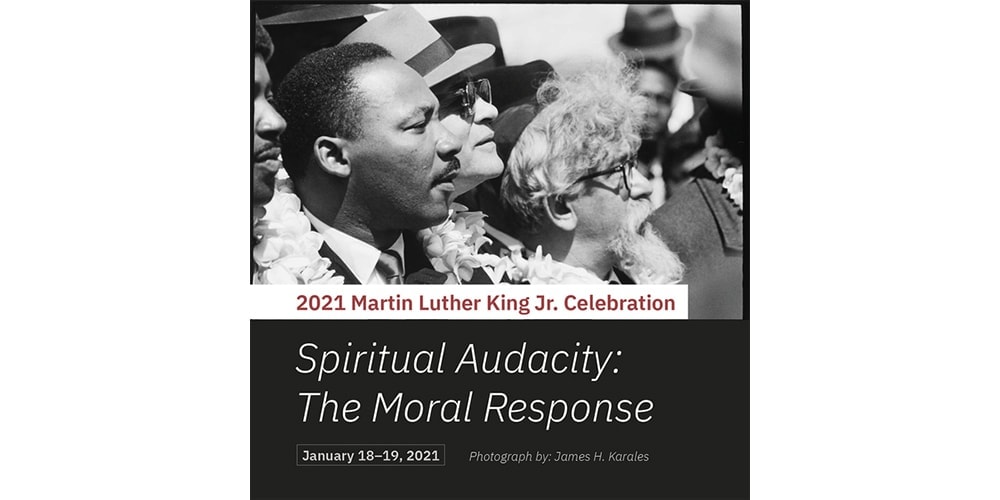
“I propose that you, Mr. President, declare [a] state of moral emergency.…
The hour calls for high moral grandeur and spiritual audacity.”—Rabbi Abraham Joshua Heschel
These words are the heart of a message that Rabbi Abraham Joshua Heschel sent by telegram to President John F. Kennedy Jr. on June 16, 1963, in advance of their meeting scheduled for the next day. In his telegram, Rabbi Heschel was lamenting the state of affairs at the time within the United States as they related to the pressing moral issues of justice and equity. Heschel urged President Kennedy to “demand of religious leaders personal involvement and not just solemn declaration … church[es] and synagogues have failed. They must repent.”
Although Heschel escaped the genocidal wrath of the Nazi regime during the Holocaust, his mother and three of his four sisters, as well as numerous members of his extended family, were killed. Not only did Heschel endure all of those things; he also endured the frustration of seeing people all across Europe (and around the world) do nothing as millions of Jews and others were killed during the Holocaust. With this context in mind, Heschel saw the inaction and apathy that existed in America in the 1960s with prophetic clarity. As a result, he committed his life as a scholar, theologian, teacher, and author to consistently shed light on the atrocities being committed against marginalized and oppressed people in general and the American descendants of enslaved persons in particular, a tragic legacy that stretches back to 1619.
Heschel is also well known to the Seventh-day Adventist community for his influential work on the seventh-day Sabbath. In his book on the Sabbath, Heschel wrote, “The Sabbath is the most precious present mankind has received from the treasure house of God. All week we think: The spirit is too far away, and we succumb to spiritual absenteeism, or at best we pray: Send us a little of Thy spirit. On the Sabbath, the spirit stands and pleads: Accept all excellence from me.”
The Reverend Dr. Martin Luther King Jr. considered his friend Rabbi Heschel “one of the truly great men of his day” and a “great prophet.” King valued Heschel’s messages to many Jewish Americans and African Americans, which promoted the idea that each person and group had responsibility for each other’s liberation and the plight of all suffering fellow humans around the world. Further, King and Heschel would provide keynote addresses at many of the same functions. Heschel also marched alongside King, John Lewis, and others across the Edmund Pettus bridge during the famous voting rights march from Selma to Montgomery in 1965.
King’s and Heschel’s shared and committed examples of advocacy were not just for the self but also for the other as they stood in solidarity in the fight to liberate all humans around the world. That advocacy remains as a powerful reminder of the fact that we, as King said, “are caught in an inescapable network of mutuality, tied in a single garment of destiny. Whatever affects one directly, affects all indirectly. I can never be what I ought to be until you are what you ought to be, and you can never be what you ought to be until I am what I ought to be. This is the interrelated structure of reality.”
In 2021, the Andrews University MLK Planning Committee, under committee chair Paulette Johnson, has chosen the theme “Spiritual Audacity: The Moral Response.” Heschel’s call for a declaration of a state of moral emergency nearly 60 years ago still seems tragically relevant and appropriate today. So, we’ll gather to honor the life of Dr. King, and we will also explore what the moral response should be in the wake of the attack against the United States Capitol building. In this current and challenging context, what might spiritual audacity look and sound like in our day and age and in response to acts of violence in our world?
Andrews University MLK Celebration will begin with a virtual University Forum Zoom webinar on Monday, January 18. Keynote speaker will be Martin Doblemeier, a documentary filmmaker. He has produced a series of three films called “Prophetic Voices,” which highlighted the lives of Dorothy Day, Howard Thurman, and Abraham Joshua Heschel. As you may know, Doblemeier has also produced a trilogy of films on Seventh-day Adventists, including one that focused on the history of Adventist education.
Andrews University’s celebration will continue Monday afternoon with an online documentary screening and panel discussion also offered as a Zoom webinar. During this meeting, Martin Doblemeier will be screening his yet-to-be-released documentary, the final part of his Prophetic Voices trilogy, “Spiritual Audacity: The Abraham Heschel Story.”
We are excited that Doblemeier has agreed to have one of the first screenings of this brand-new documentary for our campus community. The documentary will be followed by a panel discussion, which will include not only Doblemeier but other professors, a rabbi, and students.
Andrews University looks forward to celebrating King’s legacy by highlighting the powerful ministry of Rabbi Heschel and reflecting on our personal journeys. We hope that the spiritual audacity shown by King and Heschel, in the face of insurmountable odds, will inspire us as we consider what our moral response should be in these complex and challenging times that we face.
As the old African proverb states, “If you want to go quickly, go alone. If you want to go far, go together.” King and Heschel understood the necessity of going together — even though that path can be more difficult and take much longer. In the end, they knew, and we can be sure, that going together will take us much further along the path to true liberty, justice, and equity for all.
The original version of this commentary was posted on the Andrews University site.